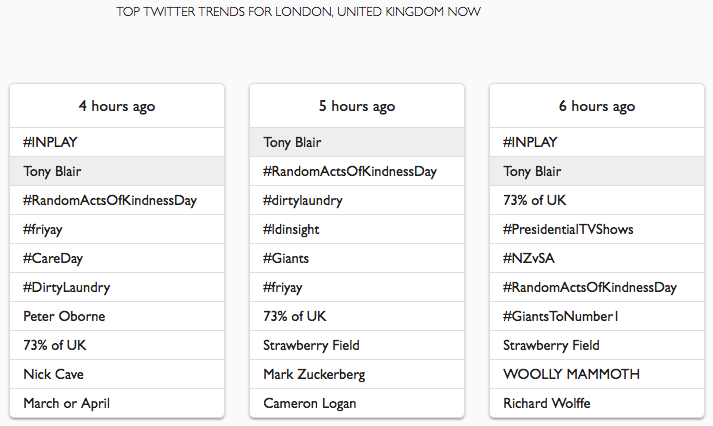/https%3A%2F%2Fblueprint-api-production.s3.amazonaws.com%2Fuploads%2Fcard%2Fimage%2F393318%2F7eabe75c-04b6-412f-8a6a-f8e56eb51358.jpg?w=900)
The Washington Post has a new slogan: Democracy Dies in Darkness.
That’s not just something for its press materials. The words are now right there below the paper’s name on the front page of its website.
Judy Asks: Is Social Media Replacing Journalism?

The practice of spreading facts to counter falsehoods has been hailed as way to counter ‘fake news’, but on the front line the picture is becoming confused
In the frantic battle against falsehoods produced by enterprising Macedonian teenagers, crackpot conspiracy theorists and, with alarming regularity, the White House, the weapon of choice has been facts, and with it the venerated practice of fact-checking.

There’s been a great deal of chatter about “fake news” in the real news lately, but has that chatter carried over to other forms of media? In the video above, Ritchie King uses our recently updated compendium of Reddit comments to find out how “fake news” is resonating on that platform. Plus, a look at how slang terms like “Yolo” have risen and fallen over time.
The New York Times has seen a lot of success with roundups in digital form: Its Morning and Evening Briefings are “among the most successful products that The Times has launched in recent years,” according to the Times’ recent 2020 Report, while its daily news podcast, The Daily, is No. 3 in iTunes.
.@nytimes moves masthead to print A2, plus adds ‘front of book’/how we do journalism type stuff; anti-#fakenewshttps://t.co/qoQBJ0CDJU
— Jonathan Make (@makejdm) March 2, 2017
Now it’s trying a version of that strategy inside the print paper with the redesign of pages A2 and A3:

“Donald Trump Rants and Raves at the Press,” Donald Trump Says, Accurately
Donald Trump launched a surprise attack on the news media on Thursday at a press conference in which he mocked and harried the White House press corps for more than an hour.
Trump, ranting and raving about how he’s not ranting and raving. I can’t even. pic.twitter.com/MvI9Jqp1vy
— Dan Froomkin (@froomkin) February 16, 2017
When it comes to attracting younger readers, the outreach efforts of The New York Times and Washington Post seem to be paying off.
New data from the Pew Research Center finds that adults under age 50 got their election news from national newspapers at rates equal to or greater than those of people over fifty. The trend was particularly clear for big national brands like the The New York Times and Washington Post, which younger adults read at twice the rate of those over fifty. (The same organizations are seeing big bumps in subscription rates post-election.)

Last month, a fire tore through an iconic Tehran high-rise building, killing more than 20 firefighters and injuring another 70 people as it collapsed.
The fire made international headlines, but it was a particularly important story for BBC Persian, the British broadcaster’s Persian-language service that targets Farsi speakers in Iran and neighboring countries.

By now we’ve all agreed the term “fake news” is unhelpful, but without an alternative, we’re left awkwardly using air quotes whenever we utter the phrase. The reason we’re struggling with a replacement is because this is about more than news, it’s about the entire information ecosystem. And the term fake doesn’t begin to describe the complexity of the different types of misinformation(the inadvertent sharing of false information) and disinformation (the deliberate creation and sharing of information known to be false).
How much can hoax stories and misinformation influence the political opinions of voters, and how much does debunking a false story change someone’s mind?
The answers to those questions remain somewhat unclear. But even if debunking stories moves the needle only a little for voters, any slight interruption to a chain of the sharing of false information on platforms like Facebook is worth it, David Schraven, cofounder and publisher of the investigative nonprofit Correctiv, told me. The outlet, founded in 2014, is Germany’s first nonprofit investigations-focused newsroom, and has published stories on everything from doping and football to superbugs to the fate of the downed Malaysia Airlines Flight 17. It’s also active in involving the interested public directly in its projects.
Craig Newmark is a creature of the internet. Like Beyoncé, a singular name defines a great brand, one he provided 22 years ago to the eponymous Craigslist. Though long associated with “free,” this organically grown San Francisco-based classifieds provider may produce a billion dollars in annual revenue sooner rather than later. Today, at 64, Newmark is all about the money — but distributing it as much as earning it.
Recode’s annual media conference, Code Media, took place in California on February 13 and 14, and featured speakers like The Washington Post’s Marty Baron and Stratechery’s Ben Thompson. You can find links to watch video of each of the panels in the posts here, but among the highlights for journalism folks:
